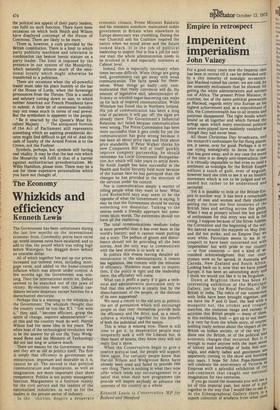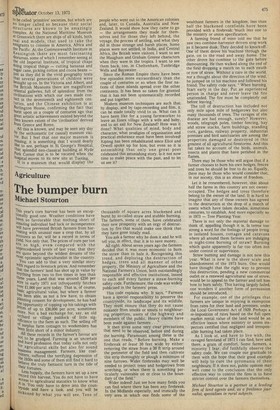Empire in retrospect
Impenitent imperialism
John Vaizey
For a good many years now the Imperial idea has been in retreat till it can be defended only by a tiny minority of nostalgic eccentrics. fain Macleod ruined his career, we are told, by the unseemly enthusiasm that he showed for getting the white administrators and settlers out of Africa. The present Prime Minister, in contrast, but of the same political generation as Macleod, regards entry into Europe as his highest achievement and, as a concomitant of this, the Commonwealth has to all intents and purposes disappeared. The tight bonds which bound us all together and which formed the strings upon which many emotional political tunes were played have suddenly vanished as though they had never been. All those Christmas Day broadcasts, and the monarch's enthusiasm for far-flung places. are, it seems, over for good. Perhaps it is ne use trying nostalgically to listen for music that has gone away, and in any case the mood of the time is so deeply anti-imperialistic that it is virtually impossible to feel even so mild a sentiment as nostalgia for the British Empire without a touch of guilt, even of anguish, however hard one tries to see it as an historic movement which is not to be judged and assessed but rather to be understood and savoured.
Yet it is possible to look at the British, Empire in another way. It has been a remarkable story of men and women and their children setting out from the four countries of the British Isles and settling across the globe. When I was at primary school the last period of enthusiasm for this story was still in full swing, I suppose because of the Silver Jubilee, the Coronation and the beginning of the war. We danced around the maypole on May DaY, and did not strike, and on Empire Day We wore white. Patriotism seems to me in retrospect to have been concerned not with 'imperialism' but with pride in our countrY — or four countries — and a kind of as" tonished acknowledgment that our countrymen were so far spread, in Australia and Canada, New Zealand and South Africa, Looking back on it, now that we have joined Europe, it has been an astonishing story and I think we would not like it to be forgotten. Down at Brighton there has been al interesting exhibition at the Municipa Gallery, just by the Royal Pavilion, of the British in India. The relics of our connection with India have been brought together, and we have the P and 0 liner, the bed with 8 mosquito net, the cricket and croquett. matches, the immense range and variety c' activities that British people — many of them. in this exhibition, Irish — got up to out there. It is very far from the whole story, of course; nothing really serious about the impact of the British on Indian society, or of the way dians saw the British, or of the political all,u economic changes that occurred. But it Is enough to make anyone with the least sense of history and knowledge of India feel nes" talgia, and elderly ladies and gentlemen are apparently coming to the show and bursting into tears. I hope Sir John Pope-Hennes will celebrate the anniversary of Victoria a! Empress with a splendid exhibition of the, sub-continent that caught our nations' imagination for two centuries. If you go round the museums you will see! lot of this imperial past, but none of it pu..t. together in the way that I would like to see At the Ethnographical Gallery there is '1 superb collection of artefacts from what use° to be called 'primitive' societies, but which are no longer called so because their social structures are known to be amazingly complex. At the National Maritime Museum at Greenwich there are ships of all kinds, both real and models, that used to take the emigrants to colonies in America, Africa and the Pacific. At the Commonwealth Institute in Kensington there are most fascinating dioramas, some of which I remember seeing at the old Imperial Institute, of tropical chaps doing tropical things — cutting bananas and tigar cane, picking cotton and cocoa beans — Just as they did in the vivid geography texts that several generations of children were brought up on. In the Victoria and Albert, and the British Museums there are magnificent oriental galleries, full of splendour from the civilisations with which our own made contact in the seventeenth and eighteenth centuries, and the Chinese exhibition is at Burlington House, confirming the fact that burst upon us a couple of centuries ago that great artistic achievements existed beyond the then known extent of the 'Civilisation' derived from Greece and Rome.
All this is known, and may be seen any day I3Y the enthusiastic (or casual) museum visitoy. But I feel that one major museum is mIssing; it is something that I would dearly lIke to see, perhaps in St George's Hospital, that splendid neo-classical building at Hyde Park Corner that is to be vacated when the hospital moves to its new site at Tooting.
It is a museum that would display the people who went out to the American colonies and, later, to Canada, Australia and New Zealand. It would show how they came to go — the arrangements they made for themselves and for those they left behind, the voyage, the process of settling, and what they did in those strange and harsh places. Some places were not settled; in India, and Central Africa, the British were visitors. I want to see the Maugham and Graham Greene characters when they were in the tropics. I want to see them back, too, in Cheltenham, Tunbridge Wells and Bayswater.
Since the Roman Empire there have been few episodes more extraordinary than the couple of centuries or so when the four nations of these islands spread over the other continents. It has been so taken for granted that it has not been systematically recorded and put together. Modern museum techniques are such that by display, and by tape-recording and film, it can be made totally vivid to us. What can it have been like for a young farmworker to leave an Essex village with a wife and baby, and to set sail for New Zealand? How was it done? What qualities of mind, body and character, what prodigies of organisation and practical endurance must have been involved! Kipling has been rehabilitated since Eliot and Orwell spoke up for him, but even so it is astonishing that only one great poet celebrated this astonishing story. Is it not now time to make peace with the past, and to let us see it?



































 Previous page
Previous page